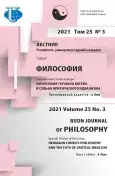The Role of Time in the Theory of Narrative Identity in the Philosophy of Paul Ricoeur
- 作者: Kumorek M.1
-
隶属关系:
- The Pontifical University of John Paul II
- 期: 卷 25, 编号 3 (2021): HERMANN COHEN'S PHILOSOPHY AND THE FATE OF CRITICAL IDEALISM
- 页面: 483-494
- 栏目: PHENOMENOLOGY AND HERMENEUTICS
- URL: https://journal-vniispk.ru/2313-2302/article/view/325015
- DOI: https://doi.org/10.22363/2313-2302-2021-25-3-483-494
- ID: 325015
如何引用文章
全文:
详细
Time has a very important function in considering the identity of a person. It is the factor that brings identity into question. The core of the problem is the question of whether the person is the same as he or she was at another time. The problem of personal identity was one of the most important issues in Paul Ricoeur’s philosophy. He considers this problem in the context of time and notes that traditional models of identity as sameness and as selfhood have been entangled in various aporias. He, therefore, proposes two new models of identity that are related in different ways to temporality: character and promise. Character is a model that changes over time through the acquisition or loss of various traits. The promise, on the other hand, is a model that resists the pressure of time attempts to keep a given word. In this way, these two different models create the framework for Ricoeur's concept of narrative identity. In this concept, time enables the development of action in a story. It allows the action to turn around, but it also allows the human being to look at the story of his or her life. Character and promise are models that allow the human being to look at his or her life as a certain temporal entity that is constantly threatened by unforeseen accidents and events but also constantly absorbs them and, through to time, gives the possibility of retrospection leading to synthesis. This synthesis allows us to look at a single life as a whole, belonging to the same person endowed with the character and challenge of keeping a promise.
关键词
作者简介
Michał Kumorek
The Pontifical University of John Paul II
编辑信件的主要联系方式.
Email: michal.kumorek@gmail.com
Ph.D. student in Philosophy
Kanonicza 25, 31-002 Kraków, Poland参考
- Kemp P. Narrative Ethics and Moral Law in Ricoeur. In: Wall J, Schweiker W, Hall DW editors. Paul Ricoeur and Contemporary Moral Thought. New York, London: Routledge; 2002. p. 32-46.
- Ricoeur P. Time and Narrative. Vol. 1. Chicago and London: The University of Chicago Press; 1984.
- Augustine. The Confessions of Saint Augustine. Grand Rapids, MI: Christian Classics Ethereal Library; 1999.
- Locke J. An Essay Concerning Human Understanding. Book II. Global Grey; 2019.
- Ricoeur P. Oneself as Another. Chicago, London: The University of Chicago Press; 1992.
- Hume D. A Treatise of Human Nature. The Floating Press; 2009.
- Parfit D. Reasons and Persons. Oxford: Clarendon Press; 1984.
- Muldoon S. Mark. Tricks of Time, Bergson, Merleau-Ponte and Ricoeur in the Search of Time, Self and Meaning. Pittsburgh: Duquesne University Press; 2006.
- Drwięga M. Paul Ricoeur daje do myślenia. Bydgoszcz: Wydawnictwo Homini; 1998.
- Aristotle. Nicomachean Ethics. Oxford: Cambridge University Press; 2004.
- Marcel G. Being and Having. Glasgow: The University Press; 1949.
- Arendt H. The Human Condition. Chicago, London: The University of Chicago Press; 1998.
- Ricoeur P. Filozofia osoby, wykłady z filozofii współczesnej im. Ks. prof. Konstantego Michalskiego CM. Kraków: Wydawnictwo Naukowe Papieskiej Akademii Teologicznej; 1992.
- Aristotle. The Poetics. Oxford: Clarendon Press; 1962.
- Ricoeur P. Time and Narrative. Vol. 3. Chicago, London: The University of Chicago Press; 1988.
- Pellauer D. Ricoeur, A Guide for the Perplexed. London: Continuum International Publishing Group; 2007.
- Maclntyre A. After Virtue: A Study in Moral Theory. Notre Dame, Ind.: University of Notre Dame Press; 2007.
- Kaplan M. David. Ricoeur’s Critical Theory. Albany: State University of New York Press; 2003.
- Ricoeur P. Memory, History, Forgetting. Chicago, London: The University of Chicago Press; 2004.
- Ricoeur P. Critique and Conviction. Conversations with François Azouvi and Marc de Launay. New York: Columbia University Press; 1998.
- Duffy M. Paul Ricoeur’s Pedagogy of Pardon, A Narrative Theory of Memory and Forgetting. London, New York: Continuum International Publishing Group; 2009.
- Levinas E. Otherwise than Being or Beyond Essence. Dordrecht: Kluwer Academic Publishers; 1991.
补充文件









